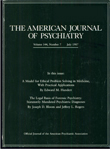Case-control study of neuroleptic malignant syndrome
Abstract
OBJECTIVE: The authors performed a case-control study of neuroleptic malignant syndrome to identify potential risk factors. METHOD: Twenty- five patients with neuroleptic malignant syndrome were matched with 50 comparison subjects on age, sex, primary psychiatric diagnosis, and time of admission to the hospital. The records of all subjects were reviewed independently by two researchers for information on postulated risk factors. Exploratory direct comparisons of the two groups were followed by a conditional logistic regression analysis. RESULTS: Patients with neuroleptic malignant syndrome were more likely to be agitated or dehydrated before the development of neuroleptic malignant syndrome, often needed restraint or seclusion, and received larger doses of neuroleptics soon after hospitalization. Previous treatment with ECT increased vulnerability. CONCLUSIONS: The prevalence of neuroleptic malignant syndrome may be reduced by avoiding large doses of neuroleptics over short periods in the management of acute psychosis and by paying adequate attention to the patient's hydration and electrolyte status.



